新课标2012-2013学年高一上学期第四次月考英语试题
- 格式:doc
- 大小:92.00 KB
- 文档页数:9
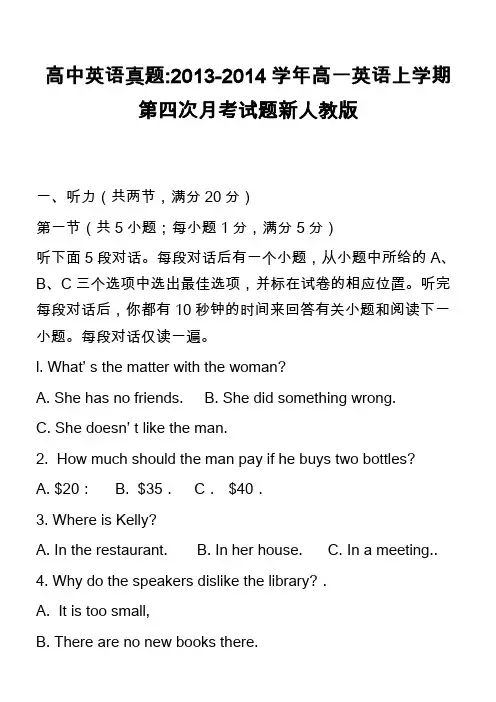
高中英语真题:2013-2014学年高一英语上学期第四次月考试题新人教版一、听力(共两节,满分20分)第一节(共5小题;每小题1分,满分5分)听下面5段对话。
每段对话后有一个小题,从小题中所给的A、B、C三个选项中选出最佳选项,并标在试卷的相应位置。
听完每段对话后,你都有10秒钟的时间来回答有关小题和阅读下一小题。
每段对话仅读一遍。
l. What’ s the matter with the woman?A. She has no friends.B. She did something wrong.C. She doesn’ t like the man.2. How much should the man pay if he buys two bottles?A. $20:B. $35. C. $40.3. Where is Kelly?A. In the restaurant.B. In her house.C. In a meeting..4. Why do the speakers dislike the library?.A. It is too small,B. There are no new books there.C. There aren’ t many people there.5. What does the man mean?A. Sarah isn’ t the best studentB. Sarah has been successful,C. Sarah should try harder.第二节(共15小题;每小题1分,满分15分)听下面5段对话或独白。
每段对话或独白后有几个小题,从题中所给的A、B、C三个选项中选出最佳选项,并标在试卷的相应位置。
听每段对话或独白前,你将有时间阅读各个小题,每小题5秒钟;听完后,各小题将给出5秒钟的作答时间。
每段对话或独白读两遍。
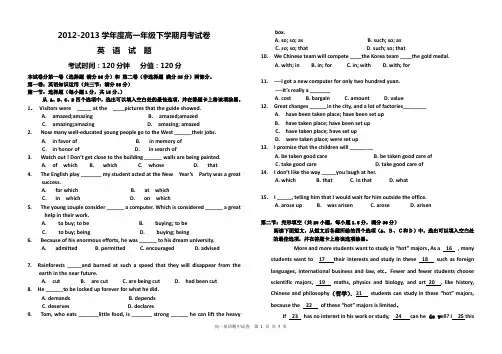
2012-2013学年度高一年级下学期月考试卷英语试题考试时间:120分钟分值:120分本试卷分第一卷(选择题满分85分)和第二卷(非选择题满分35分)两部分。
第一卷:英语知识运用(共三节:满分85分)第一节:选择题(每小题1分,共15分。
)从 A、B、C、D四个选项中,选出可以填入空白处的最佳选项,并在答题卡上将该项涂黑。
1.Visitors were _____ at the ____pictures that the guide showed.A. amazed;amazingB. amazed;amazedC. amazing;amazingD. amazing; amazed2. Now many well-educated young people go to the West ______their jobs.A. in favor ofB. in memory ofC. in honor ofD. in search of3. Watch out ! Don’t get close to the building ______ walls are being painted.A. of whichB. whichC. whoseD. that4. The English play _______ my student acted at the New Year’s Party was a greatsuccess.A. for whichB. at whichC. in whichD. on which5. The young couple consider ______ a computer. Which is considered ______ a greathelp in their work.A. to buy; to beB. buying; to beC. to buy; beingD. buying; being6. Because of his enormous efforts, he was ______ to his dream university.A. admittedB. permittedC. encouragedD. advised7. Rainforests _____and burned at such a speed that they will disappear from theearth in the near future.A. cutB. are cutC. are being cutD. had been cut8. He ______to be locked up forever for what he did.A. demandsB. dependsC. deservesD. declares9. Tom, who eats _______little food, is _______ strong ______ he can lift the heavybox.A. so; so; asB. such; so; asC. so; so; thatD. such; so; that10. We Chinese team will compete ____the Korea team ____the gold medal.A. with; inB. in; forC. in; withD. with; for11. ----I got a new computer for only two hundred yuan.----It’s really a _______A. costB. bargainC. amountD. value12. Great changes ______in the city, and a lot of factories________A. have been taken place; have been set upB. have taken place; have been set upC. have taken place; have set upD. were taken place; were set up13. I promise that the children will ________A. be taken good careB. be taken good care ofC. take good careD. take good care of14. I don’t like the way _____you laugh at her.A. whichB. thatC. in thatD. what15. I _____, telling him that I would wait for him outside the office.A. arose upB. was arisenC. aroseD. arisen第二节:完形填空(共20小题,每小题1.5分,满分30分)阅读下面短文,从短文后各题所给的四个选项(A、B、C和D)中,选出可以填入空白处的最佳选项,并在答题卡上将该选项涂黑。
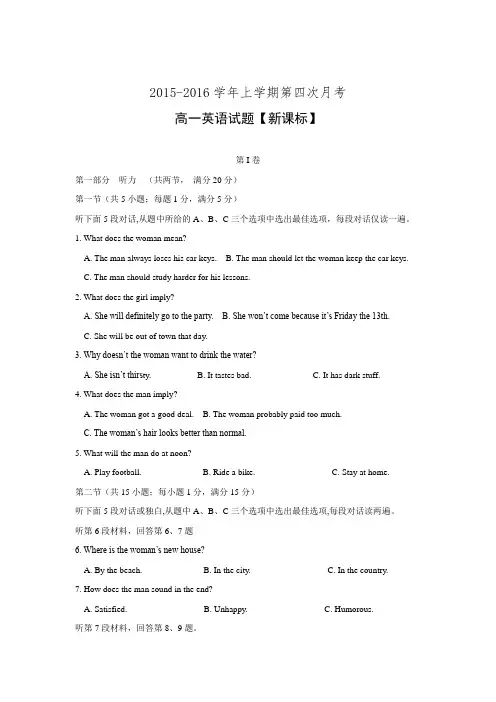
2015-2016学年上学期第四次月考高一英语试题【新课标】第I卷第一部分听力(共两节,满分20分)第一节(共5小题;每题1分,满分5分)听下面5段对话,从题中所给的A、B、C三个选项中选出最佳选项,每段对话仅读一遍。
1. What does the woman mean?A. The man always loses his car keys.B. The man should let the woman keep the car keys.C. The man should study harder for his lessons.2. What does the girl imply?A. She will definitely go to the party.B. She won’t come because it’s Friday the 13th.C. She will be out of town that day.3. Why doesn’t the woman want to drink the water?A. She isn’t thirs ty.B. It tastes bad.C. It has dark stuff.4. What does the man imply?A. The woman got a good deal.B. The woman probably paid too much.C. The woman’s hair looks better than normal.5. What will the man do at noon?A. Play football.B. Ride a bike.C. Stay at home.第二节(共15小题;每小题1分,满分15分)听下面5段对话或独白,从题中A、B、C三个选项中选出最佳选项,每段对话读两遍。
听第6段材料,回答第6、7题6. Where is the woman’s new house?A. By the beach.B. In the city.C. In the country.7. How does the man sound in the end?A. Satisfied.B. Unhappy.C. Humorous.听第7段材料,回答第8、9题。
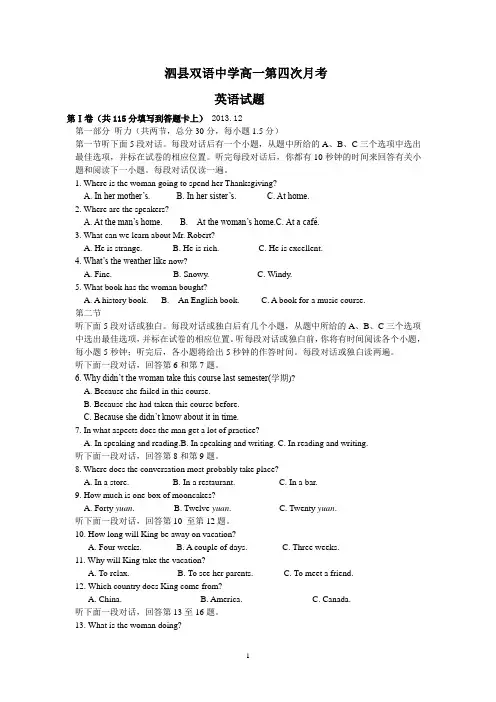
泗县双语中学高一第四次月考英语试题第Ⅰ卷(共115分填写到答题卡上) 2013.12第一部分听力(共两节,总分30分,每小题1.5分)第一节听下面5段对话。
每段对话后有一个小题,从题中所给的A、B、C三个选项中选出最佳选项,并标在试卷的相应位置。
听完每段对话后,你都有10秒钟的时间来回答有关小题和阅读下一小题。
每段对话仅读一遍。
1. Where is the woman going to spend her Thanksgiving?A. In her mother’s.B. In her sister’s.C. At home.2. Where are the speakers?A. At the man’s home.B. At the woman’s home.C. At a café.3. What can we learn about Mr. Robert?A. He is strange.B. He is rich.C. He is excellent.4. What’s the weather lik e now?A. Fine.B. Snowy.C. Windy.5. What book has the woman bought?A. A history book.B. An English book.C. A book for a music course.第二节听下面5段对话或独白。
每段对话或独白后有几个小题,从题中所给的A、B、C三个选项中选出最佳选项,并标在试卷的相应位置。
听每段对话或独白前,你将有时间阅读各个小题,每小题5秒钟;听完后,各小题将给出5秒钟的作答时间。
每段对话或独白读两遍。
听下面一段对话,回答第6和第7题。
6. Why didn’t the woman take this course last semester(学期)?A. Because she failed in this course.B. Because she had taken this course before.C. Because she didn’t know about it in time.7. In what aspects does the man get a lot of practice?A. In speaking and reading.B. In speaking and writing.C. In reading and writing.听下面一段对话,回答第8和第9题。
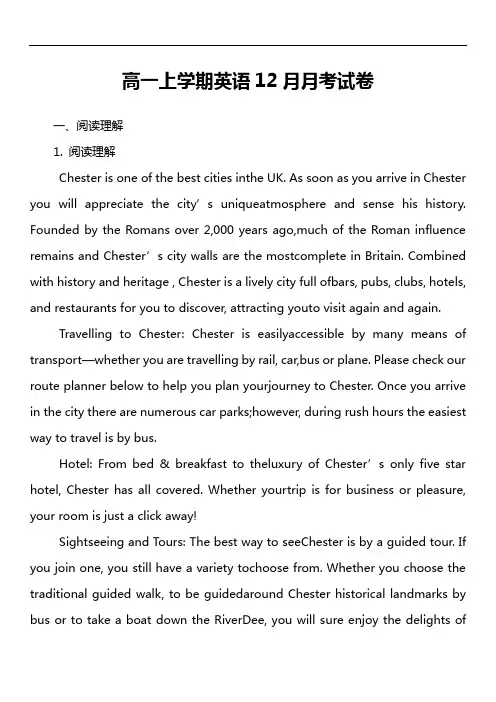
高一上学期英语12月月考试卷一、阅读理解1. 阅读理解Chester is one of the best cities inthe UK. As soon as you arrive in Chester you will appreciate the city’s uniqueatmosphere and sense his history. Founded by the Romans over 2,000 years ago,much of the Roman influence remain s and Chester’s city walls are the mostcomplete in Britain. Combined with history and heritage , Chester is a lively city full ofbars, pubs, clubs, hotels, and restaurants for you to discover, attracting youto visit again and again.Travelling to Chester: Chester is easilyaccessible by many means of transport—whether you are travelling by rail, car,bus or plane. Please check our route planner below to help you plan yourjourney to Chester. Once you arrive in the city there are numerous car parks;however, during rush hours the easiest way to travel is by bus.Hotel: From bed & breakfast to theluxury of Chester’s only five star hotel, Chester has all covered. Whether yourtrip is for business or pleasure, your room is just a click away!Sightseeing and Tours: The best way to seeChester is by a guided tour. If you join one, you still have a variety tochoose from. Whether you choose the traditional guided walk, to be guidedaround Chester historical landmarks by bus or to take a boat down the RiverDee, you will sure enjoy the delights ofChester.(1)What can we know about Chester from Paragraph 1?A . It is rich in deep culture and modern touch.B . It is the best city in the UK.C . Its city walls were completed by British people.D . It is a newly built city.(2)What is the easiest way to get around Chester city centre during rush hours?A . By bicycle.B . By bus.C . By rail.D . By taxi.(3)What’s the best way to visit Chester?A . Travelling by your own.B . Taking a pleasure-boat.C . Going there in rush hours.D . Joining a guided tour.2. 阅读理解If you want to travel from Xi’an toChengdu by train, it will take about 16 hours. But starting this month, the newXi’an-Chengdu high-speed railway will shorten this travel time to three hours.The 643-kilometer line is China’s firsthigh-speed railway to run through the Qinling Mountains, which form a naturalboundary between China’s north and south. With a speed of 250 km per hour, it’s also thefirst mountain-heavy train line to provide a 4G network. Along the way, thetrain passes through two areas for rare wild animals — one for pandas and theother for crested ibises .To reduce the railway’s influence on theanimals, workers and experts have designed and built the railway to beenvironmentally friendly. There were 345 wild pandas living in the QinlingMountains. China currently has 1,864 wild pandas in total, according to theXinhua News Agency.To avoid disturbing the pandas, the railwaywas designed to run through tunnels within the area. Protective shields are placed near the entrance of eachtunnel to stop animals from going in.To protect the thousands of crested ibisesthat fly near one part of the railway, protective nets have been set up to makesure the birds will not fly into a train.The nets are about 32 km long and 4 metershigh. Experts tested different shapes and materials for building the netsbefore making their final choice.(1)Which of the following is TRUE about the new Xi’an-Chengdu railway?A . It runs through the Qinling Mountains.B . It is China’s first high-speed railway.C . It is the best mountain-heavy train line.D . The train passes through many areas for rare wild animals.(2)Why did people build the railway to be environmentally friendly?A . To save money and energy.B . To avoid harming wild animals.C . To avoid damaging the mountains.D . To help the train run through tunnels quietly.(3)What are experts using to stop birds from flying into the train?A . Tunnels.B . Tracks.C . Protective nets.D . Protective shields.(4)What is the passage about?A . Protective shields and nets.B . How to protect pandas and crested ibises.C . Qinling Mountains.D . Xi’an Chengdu high-speed railway.3. 阅读理解October might seem to be pumpkin monthin the U.S. The holiday of Halloween comes on October 31. Americans aroundthe country are already using social media to show off their pumpkin growingand carving skills.Pumpkins are round, orange fruits relatedto squashes and gourds .People use their flesh and seeds for food, but they are also populardecorations in the fall.Two big pumpkins recently made headlines inthe U.S. A farmer in the northeastern state of Rhode Island broke the recordfor the largest pumpkin ever grown in North America. Richard Wallace’s pumpkinweighed 1,026 kilograms. It broke his son’s record from 2015. Ron Wallace’spumpkin only weighed 1,011 kilograms last year. A schoolteacher in thenorthwestern state of Washington brought her large pumpkin to an event inCalifornia. Her pumpkin was the champion, weighing 866 kilograms. It turns outthat Cindy Tobeck’s pu mpkin grew from one of the seeds from Ron Wallace’s pumpkinfrom 2015.While those pumpkins are large, they arestill not the largest in the world. According to the website ,Richard Wallace’s pumpkin is only the second-heaviest pumpkin of the year. Aman in Belgium produced a pumpkin that weighed almost 1,200 kilograms.Smithsonian magazine wrote a story about people who try to grow large pumpkins.In 35 years, the size of record pumpkins has grown from about 225 kilograms toover 1,000 kilograms. Pumpkin farmers trying to grow record fruits are takingthe seeds of champion pumpkins from one year and breeding them withother large pumpkins.But people are not just growing pumpkins.They are carving them, too.One Twitter user from Britain recently posted aphoto of a pumpkin designed to look like U.S. presidential candidate DonaldTrump. No word of a Hillary Clinton pumpkin design. But one pumpkin farmer inCalifornia allows visitors to shoot small pumpkins out of a cannon(大炮). The targets? Large paper cut-outs ofboth Trump and Clinton.(1)According to the text, which of the following statements is FALSE?A . In 2015, the then record pumpkin weighed about 1026 kilograms.B . Halloween falls on October every year.C . In the U. S., pumpkins are used for entertainment as well as for food.D . The new record pumpkin usually has biological relationship with the previous record pumpkin.(2)So far, the heaviest pumpkin was produced in ________.A . BritainB . Rhode IslandC . WashingtonD . Belgium(3)The underlined word “breeding” in the 4th paragraph probably means ________.A . improving the qualityB . producing young ones in a controlled wayC . speeding up the growing processD . strengthening the ability to resist disease (4)How is the last paragraph mainly developed?A . By telling experiences.B . By offering analyses.C . By listing examples.D . By making comparisons.4. 阅读理解Can you imagine a world without music?Studies show that public schools across the country are cutting back on musicclasses to save money. Worse, some schools have never had music classes tobegin with. But without them,students’ academic growth and emotional healthcould suffer. In fact, music classes are necessary for all students in schools.Recent studies by Brown University haveshown that students who received music education classes were better in mathand reading skills than those without music classes. Another study by TheCollege Board found that students taking music and art classes got higherpoints. Students’ academic success seems to depend on their taking part inmusic education.Music programs in public schools also helpto add to a student’s sense of pride and selfconfidence. Teens today have toomany learning tasks. Besides, they have family problems, selfconfidenceproblems, relati onship troubles, and choices about drugs and alcohol. All ofthese can stop academic success, but music education can help. A study by TheTexas Commission on Drug and Alcohol Abuse found that students who took part inschool music programs were less likely to turn to drugs. Music programsencourage students to work together to produce an excellent performance.Music crosses language, class, cultural andpolitical boundaries .Music allows students from different countries to connect. For example, at aschool talent show, a new Japanese student played a piano duet with an American classmate. Althoughthey could not communicate verbally , they were able to read the music inorder to play the duet. Two students from different cultures worked as a teamwith selfconfid ence and common purpose through music.The gift of music is priceless. We need tobe sure to have necessary music classes for all students. The world is losingits music, and putting music intoschools is the first step to get it back.(1)Education with music classes could ___________.A . waste a lot more money from parentsB . have a bad influence on the quality of educationC . lead to a lot of emotional problems easilyD . help students improve their school work(2)The two studies seem to show that ___________.A . students with great success attended music lessonsB . music plays an important role in students’ successC . not all students took part in music lessonsD . students having music classes are better in all lessons (3)The example in Paragraph 4 mainly suggests that ___________.A . music makes crosscountry communication possibleB . different cultures have different styles of musicC . Japan has a good international relationship with AmericaD . Japanese and American students are good at playing the piano(4)What is the best title for the text?A . Music — a bridge to understandingB . How to get music backC . Music education in schoolsD . The importance of listening to music二、任务型阅读5. 根据短文内容,从短文后的选项中选出能填入空白处的最佳选项。
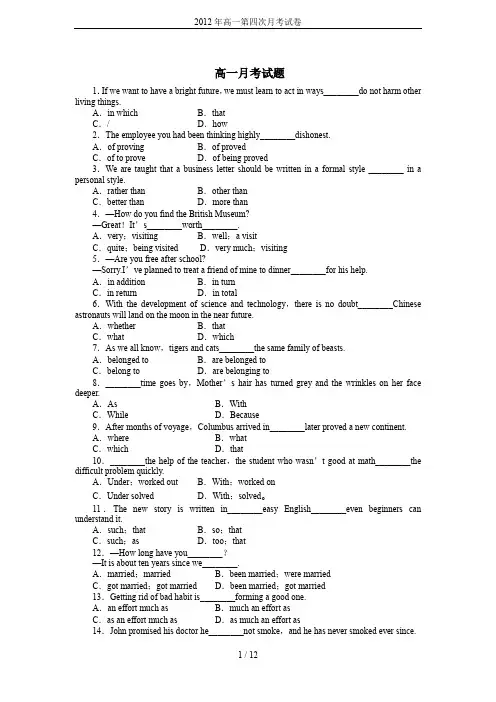
高一月考试题1.If we want to have a bright future,we must learn to act in ways________do not harm other living things.A.in which B.thatC./ D.how2.The employee you had been thinking highly________dishonest.A.of proving B.of provedC.of to prove D.of being proved3.We are taught that a business letter should be written in a formal style ________ in a personal style.A.rather than B.other thanC.better than D.more than4.—How do you find the British Museum?—Great!It’s________worth________.A.very;visiting B.well;a visitC.quite;being visited D.very much;visiting5.—Are you free after school?—Sorry.I’ve planned to treat a friend of mine to dinner________for his help.A.in addition B.in turnC.in return D.in total6.With the development of science and technology,there is no doubt________Chinese astronauts will land on the moon in the near future.A.whether B.thatC.what D.which7.As we all know,tigers and cats________the same family of beasts.A.belonged to B.are belonged toC.belong to D.are belonging to8.________time goes by,Mother’s hair has turned grey and the wrinkles on her face deeper.A.As B.WithC.While D.Because9.After months of voyage,Columbus arrived in________later proved a new continent.A.where B.whatC.which D.that10.________the help of the teacher,the student who wasn’t good at math________the difficult problem quickly.A.Under;worked out B.With;worked onC.Under solved D.With;solved。
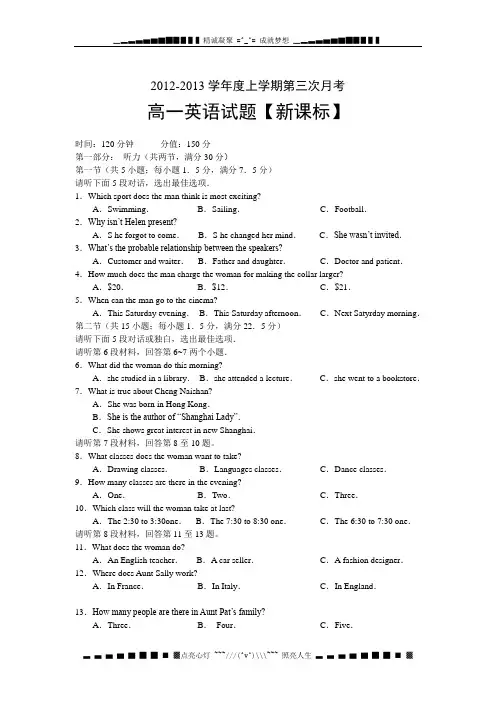
2012-2013学年度上学期第三次月考高一英语试题【新课标】时间:120分钟分值:150分第一部分:听力(共两节,满分30分)第一节(共5小题;每小题1.5分,满分7.5分)请听下面5段对话,选出最佳选项.1.Which sport does the man think is most exciting?A.Swimming.B.Sailing.C.Football.2.Why isn’t Helen present?A.S he forgot to come.B.S he changed her mind.C.She wasn’t invited.3.What’s the probable relationship between the speakers?A.Customer and waiter.B.Father and daughter.C.Doctor and patient.4.How much does the man charge the woman for making the collar larger?A.$20.B.$12.C.$21.5.When can the man go to the cinema?A.This Saturday evening.B.This Saturday afternoon.C.Next Satyrday morning.第二节(共15小题;每小题1.5分,满分22.5分)请听下面5段对话或独白,选出最佳选项.请听第6段材料,回答第6~7两个小题.6.What did the woman do this morning?A.she studied in a library.B.she attended a lecture.C.she went to a bookstore.7.What is true about Cheng Naishan?A.She was born in Hong Kong.B.She is the author of “Shanghai Lady”.C.She shows great interest in new Shanghai.请听第7段材料,回答第8至10题。
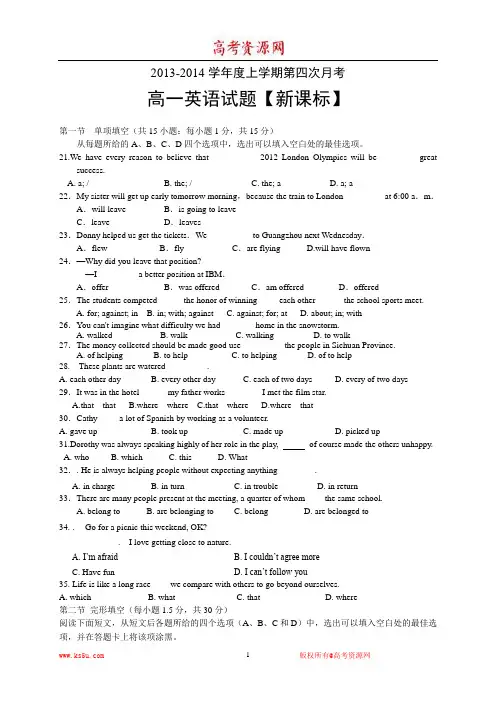
2013-2014学年度上学期第四次月考高一英语试题【新课标】第一节单项填空(共15小题:每小题1分,共15分)从每题所给的A、B、C、D四个选项中,选出可以填入空白处的最佳选项。
21.We have every reason to believe that __________ 2012 London Olympics will be ________ greatsuccess.A. a; /B. the; /C. the; aD. a; a22.My sister will get up early tomorrow morning,because the train to London _________at 6:00 a.m.A.will leave B.is going to leaveC.leave D.leaves23.Donny helped us get the tickets.We __________to Guangzhou next Wednesday.A.flew B.fly C.are flying D.will have flown24.—Why did you leave that position?—I _________a better position at IBM.A.offer B.was offered C.am offered D.offered25.The students competed _____ the honor of winning ____ each other ____ the school sports meet.A. for; against; inB. in; with; againstC. against; for; atD. about; in; with26.You can't imagine what difficulty we had _______ home in the snowstorm.A. walkedB. walkC. walkingD. to walk27.The money collected should be made good use _________ the people in Sichuan Province.A. of helpingB. to helpC. to helpingD. of to help28. These plants are watered_________ .A. each other dayB. every other dayC. each of two daysD. every of two days29.It was in the hotel ______my father works ________I met the film star.A.that thatB.where whereC.that whereD.where that30.Cathy ____ a lot of Spanish by working as a volunteer.A. gave upB. took upC. made upD. picked up31.Dorothy was always speaking highly of her role in the play, of course made the others unhappy.A. whoB. whichC. thisD. What32.. He is always helping people without expecting anything ________.A. in chargeB. in turnC. in troubleD. in return33.There are many people present at the meeting, a quarter of whom ____the same school.A. belong toB. are belonging toC. belongD. are belonged to34. . ---Go for a picnic this weekend, OK?--- ________. I love getting close to nature.A. I’m afraidB. I couldn’t agree moreC. Have funD. I can’t follow you35. Life is like a long race ____we compare with others to go beyond ourselves.A. whichB. whatC. thatD. where第二节完形填空(每小题1.5分,共30分)阅读下面短文,从短文后各题所给的四个选项(A、B、C和D)中,选出可以填入空白处的最佳选项,并在答题卡上将该项涂黑。
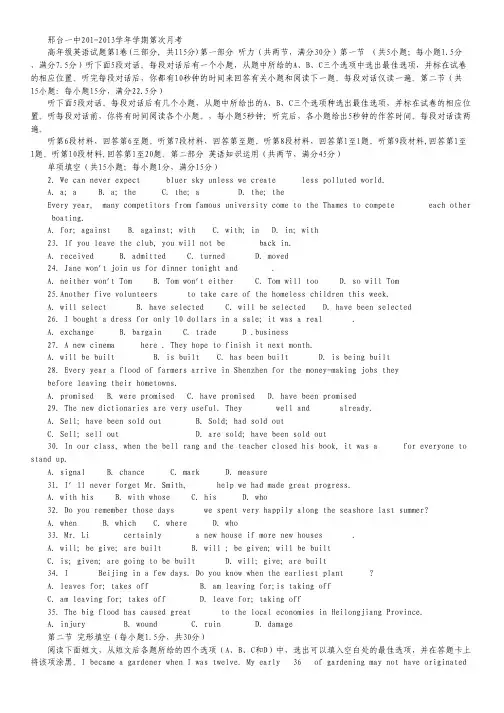
邢台一中201-2013学年学期第次月考 高年级英语试题第I卷(三部分, 共115分)第一部分 听力(共两节,满分30分)第一节 (共5小题;每小题1.5分,满分7.5分)听下面5段对话。
每段对话后有一个小题,从题中所给的A、B、C三个选项中选出最佳选项,并标在试卷的相应位置。
听完每段对话后,你都有10秒钟的时间来回答有关小题和阅读下一题。
每段对话仅读一遍。
第二节(共15小题:每小题15分,满分22.5分) 听下面5段对话。
每段对话后有几个小题,从题中所给出的A、B、C三个选项种选出最佳选项,并标在试卷的相应位置。
听每段对话前,你将有时间阅读各个小题。
,每小题5秒钟;听完后,各小题给出5秒钟的作答时间。
每段对话读两遍。
听第6段材料,回答第6至题。
听第7段材料,回答第至题。
听第8段材料,回答第1至l题。
听第9段材料,回答第1至1题。
听第10段材料,回答第1至20题。
第二部分 英语知识运用(共两节,满分45分) 单项填空(共15小题;每小题1分,满分15分) 2. We can never expect bluer sky unless we create less polluted world.A. a; aB. a; theC. the; aD. the; the Every year, many competitors from famous university come to the Thames to compete each other boating.A. for; againstB. against; withC. with; inD. in; with 23. If you leave the club, you will not be back in.A. receivedB. admittedC. turnedD. moved 24. Jane won't join us for dinner tonight and .A. neither won't TomB. Tom won't eitherC. Tom will tooD. so will Tom 25.Another five volunteers to take care of the homeless children this week.A. will selectB. have selectedC. will be selectedD. have been selected 26. I bought a dress for only 10 dollars in a sale; it was a real .A. exchangeB. bargainC. trade D .business 27. A new cinema here . They hope to finish it next month.A. will be builtB. is builtC. has been builtD. is being built 28. Every year a flood of farmers arrive in Shenzhen for the money-making jobs they before leaving their hometowns.A. promisedB. were promisedC. have promisedD. have been promised 29. The new dictionaries are very useful. They well and already.A. Sell; have been sold outB. Sold; had sold outC. Sell; sell outD. are sold; have been sold out 30. In our class, when the bell rang and the teacher closed his book, it was a for everyone to stand up.A. signalB. chanceC. markD. measure 31. I' ll never forget Mr. Smith, help we had made great progress.A. with hisB. with whoseC. hisD. who 32. Do you remember those days we spent very happily along the seashore last summer?A. whenB. whichC. whereD. who 33. Mr. Li certainly a new house if more new houses .A. will; be give; are builtB. will ; be given; will be builtC. is; given; are going to be builtD. will; give; are built 34. I Beijing in a few days. Do you know when the earliest plant ?A. leaves for; takes offB. am leaving for;is taking offC. am leaving for; takes offD. leave for; taking off 35. The big flood has caused great to the local economies in Heilongjiang Province.A. injuryB. woundC. ruinD. damage 第二节 完形填空(每小题1.5分,共30分) 阅读下面短文,从短文后各题所给的四个选项(A、B、C和D)中,选出可以填入空白处的最佳选项,并在答题卡上将该项涂黑。
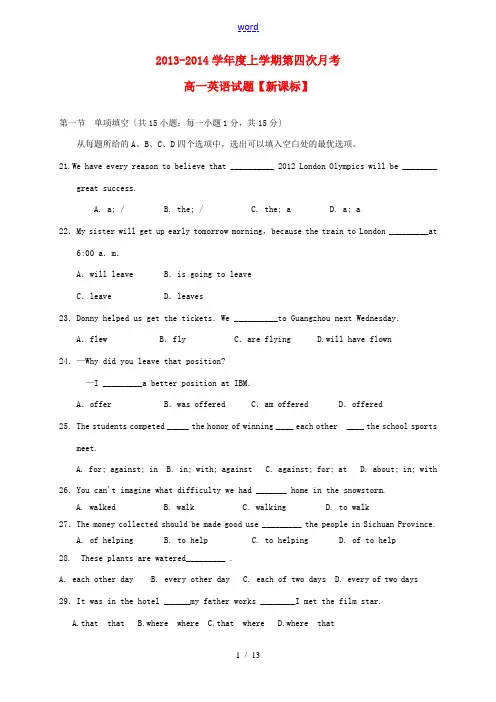
2013-2014学年度上学期第四次月考高一英语试题【新课标】第一节单项填空〔共15小题:每一小题1分,共15分〕从每题所给的A、B、C、D四个选项中,选出可以填入空白处的最优选项。
21.We have every reason to believe that __________ 2012 London Olympics will be ________great success.A. a; /B. the; /C. the; aD. a; a22.My sister will get up early tomorrow morning,because the train to London _________at 6:00 a.m.A.will leave B.is going to leaveC.leave D.leaves23.Donny helped us get the tickets.We __________to Guangzhou next Wednesday.A.flew B.fly C.are flying D.will have flown 24.—Why did you leave that position?—I _________a better position at IBM.A.offer B.was offered C.am offered D.offered25.The students competed _____ the honor of winning ____ each other ____ the school sports meet.A. for; against; inB. in; with; againstC. against; for; atD. about; in; with 26.You can't imagine what difficulty we had _______ home in the snowstorm.A. walkedB. walkC. walkingD. to walk27.The money collected should be made good use _________ the people in Sichuan Province.A. of helpingB. to helpC. to helpingD. of to help28. These plants are watered_________ .A. each other dayB. every other dayC. each of two daysD. every of two days 29.It was in the hotel ______my father works ________I met the film star.A.that thatB.where whereC.that whereD.where that30.Cathy ____ a lot of Spanish by working as a volunteer.A. gave upB. took upC. made upD. picked up31.Dorothy was always speaking highly of her role in the play, of course made the othersunhappy.A. whoB. whichC. thisD. What32.. He is always helping people without expecting anything ________.A. in chargeB. in turnC. in troubleD. in return33.There are many people present at the meeting, a quarter of whom ____the same school.A. belong toB. are belonging toC. belongD. are belonged to34. . ---Go for a picnic this weekend, OK?--- ________. I love getting close to nature.A. I’m afraidB. I couldn’t agree moreC. Have funD. I can’t follow you35. Life is like a long race ____we compare with others to go beyond ourselves.A. whichB. whatC. thatD. where第二节完形填空〔每一小题1.5分,共30分〕阅读下面短文,从短文后各题所给的四个选项〔A、B、C和D〕中,选出可以填入空白处的最优选项,并在答题卡上将该项涂黑。
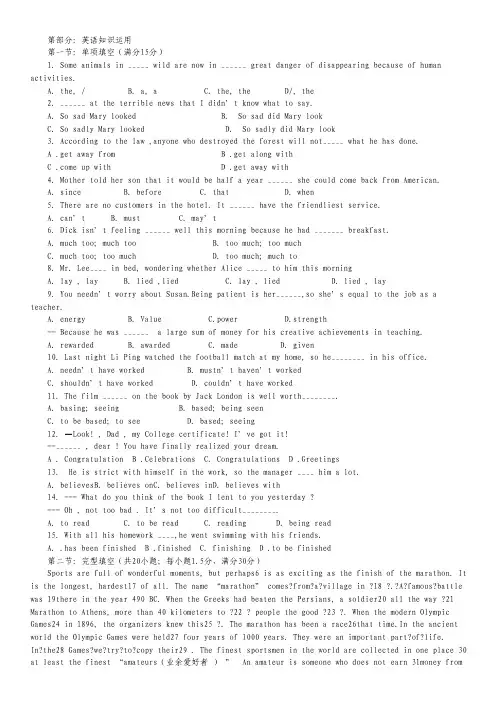
第部分:英语知识运用 第一节:单项填空(满分15分) 1.Some animals in _____ wild are now in ______ great danger of disappearing because of human activities.A. the, /B. a, aC. the, the D/, the 2.______ at the terrible news that I didn’t know what to say.A. So sad Mary lookedB. So sad did Mary lookC. So sadly Mary lookedD. So sadly did Mary look 3.According to the law ,anyone who destroyed the forest will not_____ what he has done.A .get away fromB .get along withC .come up withD .get away with 4.Mother told her son that it would be half a year ______ she could come back from American.A. sinceB. beforeC. thatD. when 5.There are no customers in the hotel. It ______ have the friendliest service.A. can’tB. mustC. may’t 6.Dick isn’t feeling ______ well this morning because he had _______ breakfast.A. much too; much tooB. too much; too muchC. much too; too muchD. too much; much to 8. Mr. Lee____ in bed, wondering whether Alice _____ to him this morningA. lay , layB. lied ,liedC. lay , liedD. lied , lay 9.You needn’t worry about Susan.Being patient is her______,so she’s equal to the job as a teacher.A. energyB. ValueC.powerD.strength -- Because he was ______ a large sum of money for his creative achievements in teaching.A. rewardedB. awardedC. madeD. given 10.Last night Li Ping watched the football match at my home, so he________ in his office.A. needn’t have workedB. mustn’t haven’t workedC. shouldn’t have workedD. couldn’t have worked 11.The film ______ on the book by Jack London is well worth________.A. basing; seeingB. based; being seenC. to be based; to seeD. based; seeing 12.—Look! , Dad , my College certificate! I’ve got it! --______ , dear ! You have finally realized your dream.A . CongratulationB .Celebrations C. Congratulations D .Greetings 13. He is strict with himself in the work, so the manager ____ him a lot.A. believesB. believes onC. believes inD. believes with 14.--- What do you think of the book I lent to you yesterday ? --- Oh , not too bad . It’s not too difficult________. A. to read C. to be read C. reading D. being read 15.With all his homework ____,he went swimming with his friends. A. .has been finished B .finished C. finishing D .to be finished 第二节:完型填空(共20小题;每小题1.5分,满分30分) Sports are full of wonderful moments, but perhaps6 is as exciting as the finish of the marathon. It is the longest, hardest17 of all. The name “marathon” comes?from?a?village in ?18 ?.?A?famous?battle was 19there in the year 490 BC. When the Greeks had beaten the Persians, a soldier20 all the way ?21 Marathon to Athens, more than 40 kilometers to ?22 ? people the good ?23 ?. When the modern Olympic Games24 in 1896, the organizers knew this25 ?. The marathon has been a race26that time.In the ancient world the Olympic Games were held27 four years of 1000 years. They were an important part?of?life.In?the28 Games?we?try?to?copy their29 . The finest sportsmen in the world are collected in one place 30 at least the finest “amateurs(业余爱好者 ) ” An amateur is someone who does not earn 31money fromsport. It is often difficult to say who is an amateur and who is not. It is ?32 ?that Olympic athletes do not earn large amounts of? money like professional (职业的)sportsmen. But Olympic athletes are often students or?teachers of a3 ?. They have?to34 a lot of time training. Their governments pay for their training travel and pocket money, 35they want them to win. Some people think this changes the Olympics. They feel that the Games are now a political marathon. 16.A.something B.everything C.anything D.nothing 17.A.run B.race C.game D.match 18.A.Greece B.England C.America D.France 19.A.broken out B.fought C.happened D.taken place 20.A.went B.drove C.ran D.walked 21.A.in B.of C.with D.from 22.A.tell B.say C.talk D.show 23.A.story B.film C.result D.news 24.A.held B.broke out C.had D.started 25.A.news B.soldier C.story D.race 26.A.at B.from C.after D.since 27.A.in B.each C.every D.after 28.A.modern B.exciting C.interesting D.important 29.A.plans B.diaries C.ideas D.programs 30.A.and B.but C.where D.or 31.A.some B.any C.a little D.much 32.A.true B.false C.a lie D.interesting 33.A.country B.lesson C.game D.sport 34.A.use B.take C.spend D.cost 35.A.as B.because C.since D.if 清空删除设置上移下移 第二部分:阅读理解(共两节,满分40分) 第一节(共15小题;每小题2分,满分30分) A. America is a mobile society. Friendships between Americans can be close and real, yet disappear soon if situations change. Neither side feels hurt by this. Both may exchange Christmas greetings for a year or two, perhaps a few letters for a while — then no more. If the same two people meet again by chance, even years later, they pick up the friendship. This can be quite difficult for us Chinese to understand, because friendships between us develop more slowly but then may become lifelong feelings, extending(延伸) sometimes deeply into both families. Americans are ready to receive us foreigners at their homes, share their holidays, and their home life. They will enjoy welcoming us and be pleased if we accept their hospitality(好客) easily. Another difficult point for us Chinese to understand Americans is that although they include us warmly in their personal everyday lives, they don’t show their politeness to us if it requires a great deal of time. This is usually the opposite of the practice in our country where we may be generous withour time. Sometimes, we, as hosts, will appear at airports even in the middle of the night to meet a friend. We may take days off to act as guides to our foreign friends. The Americans, however, express their welcome usually at homes, but truly can not manage the time to do a great deal with a visitor outside their daily routine. They will probably expect us to get ourselves from the airport to our own hotel by bus. And they expect that we will phone them from there. Once we arrive at their homes, the welcome will be full, warm and real. We will find ourselves treated hospitably. For the Americans, it is often considered more friendly to invite a friend to their homes than to go to restaurants, except for purely business matters. So accept their hospitality at home! 36.The writer of this passage must be ______.A. an AmericanB. a ChineseC. a professorD. a student 8.From the last two paragraphs we can learn that when we arrive in America to visit an American friend, we will probably be ______.A. warmly welcomed at the airportB. offered a ride to his/her homeC. treated hospitably at his/her homeD. treated to dinner in a restaurant 39.The underlined words “generous with our time” in Paragraph 3 probably mean ______.A. strict with timeB. serious with timeC. careful with timeD. willing to spend time B THE WAY TO READ FAST Perhaps you have been told about some habits(习惯) which stop a person reading fast、and have been strongly asked to break those habits which you might have. ?Do you still have any of these bad habits7 Check yourself by answering "yes" or "no" to these questions: 1. Do you move your lips(嘴唇) when reading silently? 2. Do you point to words with your finger as you read? 3. Do you move your head from side to side as you read?Do you read one word at a time? If you answer "yes" to any of these questions, start at once to break the habit. If you move your lips, hold your fingers over them, or hold a piece of paper between your lips while you are reading. Then if your lips move, you will know it and can stop them. If you point to words, hold the two sides of your book, one side with your left hand, the other side with your right hand. Then you will not have a free finger to use in pointing while reading. 40.You may hold your fingers over your lips while reading? A. to hold a piece of paper between them B. to stop yourself talking to others C. to tell others to be silent D. to feel whether your lips move or not 1. When your eyes travel across the lines of words, A. you need to read the words out B. you need to look at every word carefully C. you need to read several words at a time D. you need to remember every word 42.When you read, A. don’t use your finger to point to words B. don’t hold your books with your hands C. don’t hold your head still D. don’t do any of the things mentioned (提到) above. C What will man be like in the future—in 5000 or even 50, 000 years from now? We can only make guesses, of course, but we can be sure that he will be different from what he is today, for man is slowly changing all the time. Let us take an obvious example. Man, even five hundred years ago , was shorter than he is today. Now, on average men are about three inches taller. Five hundred years is a relatively short period of time, so we may assume that man will continue to grow taller. Again, in the modem world we use our brains a great deal. Even so, we still make use of only about 20% of the brain’ s capacity(容量). As time goes on , however , we shall have to use our brains more and more, and eventually we shall need larger ones! This is likely to bring about a physical change too: the head, in particular the forehead, will grow larger. Nowadays our eyes are in constant use. In fact , we use them so much that very often they become weaker and we have to wear glasses. But over a very long period of time it is likely that man’ s eyes will grow stronger. On the other hand, we tend to make less use of our arms and legs. These, as a result, are likely to grow weaker. At the same time, however , our fingers will grow more sensitive(敏感的) because they are used a great deal in modern life. But what about hair? This will probably disappear from the body altogether in course of time because it does not serve a useful purpose any longer. In the future, then, both sexes are likely to be bald. Perhaps all this gives the impression that future man will not be a very attractive creature to look at! This may well be true. All the same, in spite of all these changes, future man will still have a lot in common with us. He will still be a human being, with thoughts and emotions similar to our own. … 43.The passage mainly tells us that _______. A. man’s life will be different in the future. B. future man will look quite different from us. C. man is growing taller and uglier as time passes. D. human’s organs’ functions will become weak “ 4.The change in man’s size of forehead will probably be because ___________. A. he makes use ony20% of the brain’s capacity. B. his brain has grown larger over the past centuries. C. the other 80% of his brain will grow in due time D. he will use his brain more and more as time goes on : 45.What will be true about a human being in the future? A. He will be hairless because hair is no longer useful. B. He will have smaller eyes and will wear better glasses. C. His fingers will grow weaker because he won’t have to make use of them. D. He will think and feel in a different way. 46.It is implied that ________. A. human beings will become less attractive in the future B. less use of a bodily organ may lead to its degeneration(退化,) C. human beings hope for a change in the future life D. future life is always predictable D About six years ago I was eating lunch in a restaurant in New York City when a woman and a young boy sat down at the next table, I couldn’t help overhearing parts of their conversation. At one point the woman asked, “So, how have you been?” And the boy — who could not have been more than seven or eight years old — replied. “Frankly, I’ve been feeling a little depressed lately.” This incident stuck in my mind because it confirmed (确认) my growing belief that children are changing. As far as I can remember, my friends and I didn’t find out we were “depressed”, that is, in low spirits, until we were in high school. ?Undoubtedly a change in children has increased steadily in recent years. Children don’t seem childlike anymore. Children speak more like adults, dress more like adults and behave more like adults than they used to. ?Whether this is good or bad is difficult to say, but it certainly is different. Childhood as it once was no longer exists. Why? ?Human development is depended not only on born biological states, but also on patterns of gaining social knowledge. Movement from one social role to another usually involves learning the secrets of the new social positions. Children have always been taught adult secrets, but slowly and in stages; traditionally, we tell sixth graders things we keep hidden from fifth graders. ?In the last 30 years, however, a secret-revelation (揭示) machine has been equipped in 98 percent of American homes. It is called television. Television passes information to all viewers alike, whether they are children or adults. Unable to resist the temptation (诱惑) , many children turn their attention from printed texts to the less challenging, more attractive moving pictures. Communication through print, as a matter of fact, allows for a great deal of control over the social information which children will gain. Children must read simple books before they can read complex materials. 47.According to the author, feeling depressed is ________. A.a sure sign of a mental problem in a child B.a mental state present in all humans, including children C.something that cannot be avoided in children’s mental development D.something hardly to be expected in a young child 48.Traditionally, a child is supposed to learn about the adult world _________. A.through connection with society B.gradually and under guidance C.naturally without being taughtD.through watching television 9.According to the author, that today’s children seem adultlike results from ______. A.the widespread influence of television B.the poor arrangement of teaching content C.the fast pace of human scientific development D.the rising standard of living 0.What does the author think of communication through print for children? A.It enables children to gain more social information. B.It develops children’s interest in reading and writing. C.It helps children to read and write well. D.It can control what children are to learn. 第二节(共5小题;每小题2分,满分10分) 选项中有两项为多余选项。
2012-2013学年高一上学期新课程模块考试英语试题 姓名: 班别: 学号: 成绩: 第一部分:语言知识及运用(共两节,满分45分) 第一节:完形填空(共15小题;每小题2分,满分30分) Once upon a time, a rich man wanted to make a trip (旅行) to another town. He tried not only to take things to sell but also to take money to 1 things with. He 2 to take ten servants with him. They would 3 the things to sell and the food to 4 on their trip. Before they started, a little boy ran up to 5 and asked to 6 with them. The rich man said to the little boy, “Well, 7 may go with us. 8 you are the smallest, the thinnest and the weakest of all my 9 , you can’t carry a 10 load (担子). You must 11 the lightest one to carry.” The boy thanked his master and chose the biggest load to carry. That was bread. “You are 12 .” said his master, “That is the biggest and the heaviest one.” The boy said 13 and lifted the load gladly. On the trip they walked for days and at last they got to the town. All the servants were tired 14 the little servant. Do you know 15 ? Most of the bread was eaten during the trip and a little wasleft when they arrived at the town. 1. A. eat B. buyC. changeD. get 2. A. decidedB. likedC. hopedD. tried 3. A. takeB. bringC. carry D. borrow 4. A. cook B. eatC. buy D. drink 5. A. themB. the servants(仆人C. the road D. the rich man 6. A. stopB. stayC. go D. talk 7. A. youB. heC. I D. they 8. A. Since B. IfC. Because D. But 9. A. family B. guestsC. servantsD. things 10. A. heavy B. lightC. smallD. difficult 11. A. eat B. choose C. pick upD. understand 12. A. brave B. rightC. cleverD. foolish 13. A. sorry B. nothing C. angrilyD. good-bye 14. A. besides B. ofC. exceptD. with 15. A. who B. him C. thatD. why 第二节:(共1小题;每小题分,满分分) said that thousands 18.______ houses 19._________(destroy) , so you can’t have your classes as usual at present. I wonder 20.___ ____ things have got better by now. Don’t lose heart and be strong-minded 21.______ you are facing the great disaster, for people all over China are standing by you. I’d like to send you some books 22._______ were bought last week. I hope they will be 23.________ (help) to your study. Please keep in touch with me 24.________ I will try my best to help you. I believe that you will overcome all the 25.____________(difficulty) and live a new happy life. Yours truly, Li Ming 第二部分:阅读理解(共小题;每小题2分,满分分)A young woman carrying a three-year-old child got on a bus. The conductor hurried to give her a warm welcome and then kindly asked the other passengers to make more room for the woman and her child. On seeing this, people began to talk. "You know this conductor used to be very rude. Now suddenly he has changed his bad behavior, "said a middle-aged man. "Yes, he should be praised and we must write a letter to the company," said a second passenger. "That's right," another lady said, "I wish a newspaper reporter were here so that more people could learn from this conductor.” Just then a gentleman who looked like a teacher turned to the conductor and said, "Excuse me, but can I know your name, please? Your excellent service must be praised..." Before he could open his mouth, the three-year-old child sitting on the young woman's lap interrupted, "I know his name. I call him Dad." 26. The passengers were ________ to see the conductor's kindness to the woman and the child.A. excitedB. pleasedC. interestedD. surprised 27. One passenger suggested writing a letter to the company to ______. A. make a demand for more buses B. thank the conductor for his good service C. criticize the conductor for his rude behavior D. invite a newspaper reporter to write about the conductor 28. Who was the three-year-old child?A. A teacher.B. A strange passenger.C. The conductor's son.D. Not known from the story. 29. The word "he" in the last paragraph refers to _______.A. the gentlemanB. the conductorC. the middle-aged manD. the three-year-old child 30. It is clear from the story that the conductor _______. A. has changed his attitude towards his work B. has now been kind and polite to all passengers C. has not changed his rude behavior to passengers D. has now been kind and polite to women with children B It is important to know another language and how to communicate without words when you are in another country. Before saying anything, people communicate with each other by using gestures(手势). However, many gestures have different meanings, or no meaning at all, in different parts of the world. In the United States, nodding your head up and down means “yes”, while in some pats of Greece and Turkey, it means “no”. In the southeast of Asia, it is a polite way of saying “I heard you”. Today in the USA, when someone puts his thumb up, it means “Everything is all right.” However, in Greece it is bad. Also putting your clasped(紧握的)hands up above your head means “I am the winner.”It is the sign which players often make. In Russia it is the sign of friendship. In the USA, holding your hand up with the thumb and index finger(食指), and the other three straight means “Everything is OK.” In France, it means “You are worth nothing.” It is also important to make eye communication. If you look down when talking to an American, he or she may feel that you are shy, or you are trying to hide something. Besides these, you should also know there are some topics that can not be talked about, such as age, weight and marriage. You can talk about the weather, work, sports, food, where one lives and news of the day. 31. Which of the following is true? A. People all over the world only communicate by words. B. Many gestures either have different meanings or no meanings at all. C. Gestures are the most common way to communicate. D. People can talk about anything in another country. 32. In Greece nodding your head means “_________.”A. Yes.B. NoC. I heard youD. I am the winner 33. Putting the thumb up should Not be used in _____.A. GreeceB. the USAC. EnglandD. China 34. If you look down when talking to an American, it may means_____.A. You are shy.B. You don’t like the topic.C. You are trying to hide something.D. Both A and C. 35. The main idea of the passage is that when you are in another country, _____. A. it is important to know the language. B .it is important to know what you talk about to a foreigner. C. to know how to communicate without words is as important as to know the language. D. to communicate through gestures is more important than to know the language. C Will it matter if you don't take your breakfast? Recently a test was given in the United States. Those tested included people of different ages, from 12 to 83. During the experiment, these people were given all kinds of breakfasts, and sometimes they got no breakfast at all. Special tests were set up to see how well their bodies worked when they had eaten a certain kind of breakfast. The results show that if a person eats a proper breakfast, he or she will work with better effect than if he or she has no breakfast. This fact appears to be especially true if a person works with his brains. If a student eats fruit, eggs, bread and milk before going to school, he will learn more quickly and listen with more attention to class. Opposite to what many people believe, if you don't eat breakfast, you will not lose weight. This is because people become so hungry at noon that they eat too much for lunch, and end up gaining weight instead of losing. You will probably lose more weight if you reduce your other meals. 36. During the test, those who were tested were given ________.A. no breakfast at allB. very rich breakfastC. little food for breakfastD. different breakfast or none 37. The results of the test show that ________. A. breakfast has great effect on work and studies B. breakfast has little to do with a person s work C. a person will work better if he has a simple breakfast D. those working with brains should have much for breakfast 38. The passage mentions that many people believe that if you don't eat breakfast, you will_________.A. lose weightB. not lose weightC. be healthierD. gain a lot of weight 39. Which of the following is Not true according to the passage? A. Poor breakfasts affect those who work with brains. B. Morning diet may cause one to get fatter. C. Reducing lunch and supper is of less value in weight losing. D. Eating less in lunch and supper may help to lose weight. 40. According to the passage, if a student does not eat breakfast, ___________.A. he will fall illB. he will fail to listen to his teacherC. he will not make progress in his studyD. his mind will work more slowly 第三部分:基础知识(共两节,满分40分) 第一节:(共小题,满分分) ’s mind 47. make up one’s mind 48. play a part (in) 49. care about 50. a (great) number of 第二节:(共5小题,满分分) 1. 众所周知,中国是一个拥有悠久历史的国家。
2013-2014学年度上学期第二次月考高一英语试题【新课标】第I卷(三部分, 共115分)第一部分听力(共两节,满分30分)第一节(共5小题;每小题1.5分,满分7.5分)听下面5段对话。
每段对话后有一个小题,从题中所给的A、B、C三个选项中选出最佳选项,并标在试卷的相应位置。
听完每段对话后,你都有10秒钟的时间来回答有关小题和阅读下一题。
每段对话仅读一遍。
1.Where might Mr Brown go?A. To a theatre.B. To a book shop.C. To a library.2. How many lessons will the man have to review at the weekend?A. 3.B. 12.C. 15.3. Where are the two speakers?A. In a shop.B. In a restaurant.C. In a supermarket.4. What are the speakers discussing?A. Taking a class together.B. Getting enough courses.C.Signing up for a society .5. What does the woman want to do?A. Have a cup of coffee.B. Get up early.C. Go home.第二节(共15小题:每小题1.5分,满分22.5分)听下面5段对话。
每段对话后有几个小题,从题中所给出的A、B、C三个选项种选出最佳选项,并标在试卷的相应位置。
听每段对话前,你将有时间阅读各个小题。
,每小题5秒钟;听完后,各小题给出5秒钟的作答时间。
每段对话读两遍。
听第6段材料,回答第6至7题。
6. Where are the speakers?A. At a party.B. At home.C. At a shop.7. What does the man suggest the woman wear?A. The purple shirt.B. The long white dress.C. The black evening dress.听第7段材料,回答第8至10题。
2012-2013学年度上学期第四次月考高一英语试题【新课标】本试卷共120分,考试时长100分钟。
第一部分:听力理解(共三节,30分)第一节(共5小题,每小题1.5分,共7.5分)听下面5段对话,每段对话后有一道小题,从每题所给的A、B、C三个选项中选出最佳选项,听完每段对话后,你将有10秒钟来回答有关小题和阅读下一小题。
每段对话你将听一遍。
1.What would the man like to do tonight?A.Stay indoors.B.Rent an old play.C.Go to the theatre.2.What does the woman suggest the man buy?A.Some books.B.A C D.C.A computer.3.What will the woman do next?A.Prepare for the party.B.Talk with the man.C.Finish her drink.4.Where will the speakers go first tomorrow?A.To a museum.B.To a garden.C.To a castle.5.What are the speakers mainly talking about?A.The arrangement of the furniture.B.The decoration of the walls.C.The color of the room第二节(共10小题;每小题1.5分,共15分)听下面4段对话。
每段对话后有几道小题,从每题所给的A、B、C三个选项中选出最佳选项。
听每段对话前,你将有5秒钟的时间阅读每小题。
听完后,每小题将给出5秒钟的作答时间。
每段对话你将听两遍。
听第6段材料,回答第6至7题。
6.What is the man?A.A student.B.A worker.C.A repairman.7.What does the man plan to do in six months?A.Find a part-time job.B.Buy a motorcycle.C.Pay off his loan.听第7段材料,回答第8至9题。
8.What is the probable relationship between the speakers?A.Find a part-time job.B.Buy a motorcycle.C.Pay off his loan.9.How much money does the woman give the man?A.£1.2.B.£1.C,£0.2听第8段材料,回答第10至12题。
…10.When does the conversation take place?A.In the morning.B.At noon.C.In the evening.11.Why did the woman call the man?A.To invite him to dinner.B.To change their appointment.C.To invite him to visit their friends.12.What will the man do next Saturday?A.Attend a wedding.B.Go to the woman’s house.C.Go on business in Scotland.听第9段材料,回答第13至15题。
13.Why does the man want to sell the computer?A.He thinks its memory is small.B.He doesn’t li ke its color.C.He has just bought a new one.14.What will be sold with the computer together?A.Headphones.B.A mouse.C.A bag.15.How much does the man want to sell the computer for?A.£500.B.£480.C.£425.第三节听取信息(共5小题;每小题1.5分,共7.5分)听下面一段独白,请根据题目要求,从所听到的内容中获取必要的信息,填入标号为16-20的空格中。
听录音前你将有10秒钟的阅题时间,录音读两遍。
你将有60秒钟的作答时间。
(注意:每空只填写一个词)第二部分:知识运用(共两节,40分)第一节单项填空(共10小题:每小题1分,共10分)从每题所给的A、B、C、D四个选项中,选出可以填入空白处的最佳选项。
21.Donny helped us get the tickets.We __________to Guangzhou next Wednesday.A.flew B.fly C.are flying D.will have flown 22.My sister will get up early tomorrow morning,because the train to London _________at 6:00 a.m.A.will leave B.is going to leaveC.leave D.leaves23.He ________more than 5,000 English words when he entered the university at the age of l5.A.had learned B.would have learnedC.learned D.has learned24.—Why did you leave that position?—I _________a better position at IBM.A.offer B.was offered C.am offered D.offered 25.I’d like to arrive 20 minutes early _______I can have time for a cup of tea.A.as soon as B.as a result C.so that D.in case 26.Many women can’t stand __________at home by themselves in the deep night.A.to stay B.staying C.stayD.stayed27.Sarah,hurry up,I’m afraid you don’t have time to__________.A.get change B.get changingC.get to change D.get changed28.Y ou can’t have this football back _________you promise not to kick at my cat again.A.because B.until C.when D.since 29.The first two services are free,______the third costs£35.A.while B.whether C.what D.which 30.John is the tallest boy in the class, __________according to himself.A.five foot eight as tall as B.as tall as five foot eightC.as five foot eight tall as D.as tall five foot eight as第二节完形填空(共20小题;每小题1.5分,共30分)阅读下面短文,掌握其大意,从每题所给的A、B、C、D四个选项中,选出最佳选项。
“Meg, we need to talk.”“Sure thing, Dad.”“I have been to the____31____ several times over the last few days, and well, Meg, I have a brain cancer.’“Okay.” .“Just okay?’’“Y ep, just okay.”It was the second half of my senior year, that______32____in a girl’s life when all the really big exciting events are happening.My final performance, my eighteenth birthday and my graduation,all ____33______my mind in just two short months.By my final performance Dad couldn’t really give his full ____34___ on it, but he was there.He bravely sat through my birthday dinner.and he, ____35____to get out of the hospital for my graduation.____36_____those months, we both were caring about the same thing—me.His doctor said that by _____37____on all my future events, it kept my dad ___38___longer.Nine days after my high school graduation, my father died.For the next two weeks after his ____39__.I didn’t leave my room.Finally, my mom came in, opened my blinds and gave me a letter.It was from my father’s doctor.He wrote about how my father _____40___him to change his life and the way he worked.“…He was not _____41____a patient to me.He ___42____ more for the people around him than he did his own _____43_____ .I have never met someone who put everyone else first.He was the type of person I ____44____to be.”I was _____45______.I came to know what I should do.Days later, I got a job as a summer camp counselor.I ___46__everything I had to these little kids, and slowly they helped to heal me without even ____47____ what they were doing.Their innocence had helped me ______48____ some of mine.That summer _____49______ parts of the life my father led in his last few days.I had learned the ______50_____ lesson my father was teaching me—in order to lead a fulfilling life, you must learn how to give of yourself to others.31.A.doctor B.baker C.teacher D.lawyer 32.A.time B.goal C.story D.thing 33.A.sharpened B.changed C.occupied D.influenced 34.A.congratulation B.presentation C.description D.concentration 35.A.failed B.intended C.decided D.fought 36.A.Since B.After C.During D.With 37.A.depending B.focusing C.insisting D.counting 38.A.alive B.active C.awake D.calm 39.A.recovery B.treatment C.ceremony D.funeral 40.A.forced B.inspired C.persuaded D.begged 41.A.even B.just C.always D.yet 42.A.cared B.paid C.prepared D.praised 43.A.benefit B.effort C.pain D.value 44.A.continue B.manage C.desire D.agree 45.A.disappointed B.surprised C.determined D.touched 46.A.forgave B.promised C.abandoned D.contributed 47.A.realizing B.believing C.guessing D.suspecting 48.A.maintain B.prove C.rediscover D.believe 49.A.indicated B.mirrored C.followed D.performed 50.A.1ively B.final C.interesting D.painful第三部分:阅读理解(共两节,40分)第一节:(共15小题;每小题2分,共30分)阅读下列短文,从每题所给的A、B、C、D四个选项中,选出最佳选项。